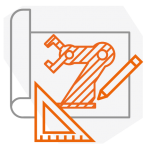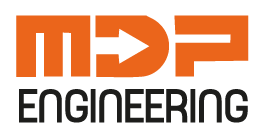Tworzenie stanowisk zrobotyzowanych wraz z ich uruchomieniem.
Implementation of Robotic Workstations with Commissioning
Automated production robots play a key role in executing complex processes on the production line in a short time. At MDP Engineering, we have a team of robotics and machine design experts who combine their knowledge to implement innovative robotic workstation solutions for our clients.
Benefits of Implementing Robotic Workstations
Implementing robotic workstations in production processes brings numerous benefits that can significantly improve a company’s efficiency and competitiveness. Here are the key advantages of robotization.
To learn more, please contact us.
With our expertise, you can avoid many mistakes in building a production line.
Cost Optimization:
- Reduced Production Costs: Robotization enables optimal use of available resources, leading to lower production costs.
- Long-Term Savings: Investing in robotization can yield significant cost savings in the long run.
Improved Product Quality:
- Precision and Accuracy: Robots are far more precise than humans, resulting in higher quality final products.
- Reduced Complaint Rates: Automated production processes minimize the risk of human errors, leading to fewer complaints.
Increased Production Efficiency:
- Speed and Continuity: Robots can operate continuously, increasing production efficiency and shortening order fulfillment times.
- Higher Product Output: Automation enables the production of a larger number of goods in the same timeframe, opening new expansion opportunities for companies.
At MDP Engineering, we offer comprehensive services related to the implementation of robotic workstations, including:

Design and Construction:
Designing and constructing robotic workstations are key stages in the automation implementation process. These involve a range of activities aimed at creating systems tailored to the specific needs and requirements of the client.
- Client Requirements Analysis
- Workstation Design
- Equipment and Component Selection
- Construction and Prototyping
- Assembly and Integration
- Testing and Commissioning

System Integration:
System integration is a critical stage in implementing robotic workstations. It involves connecting robots with other production systems, such as assembly machines, control systems, or production management systems, to ensure seamless collaboration and maximum process efficiency.
- System Requirements Analysis
- Integration Planning
- System Implementation
- Testing and Commissioning

Commissioning and Training:
Commissioning robotic workstations and conducting appropriate training are crucial steps in the automation implementation process. These ensure that the system operates reliably and efficiently, and employees are prepared to operate it.
Commissioning Stages:
- System Testing
- Production Launch
- Monitoring and Optimization
Employee Training:
- Basic Training
- Advanced Training
- Production Management Training
